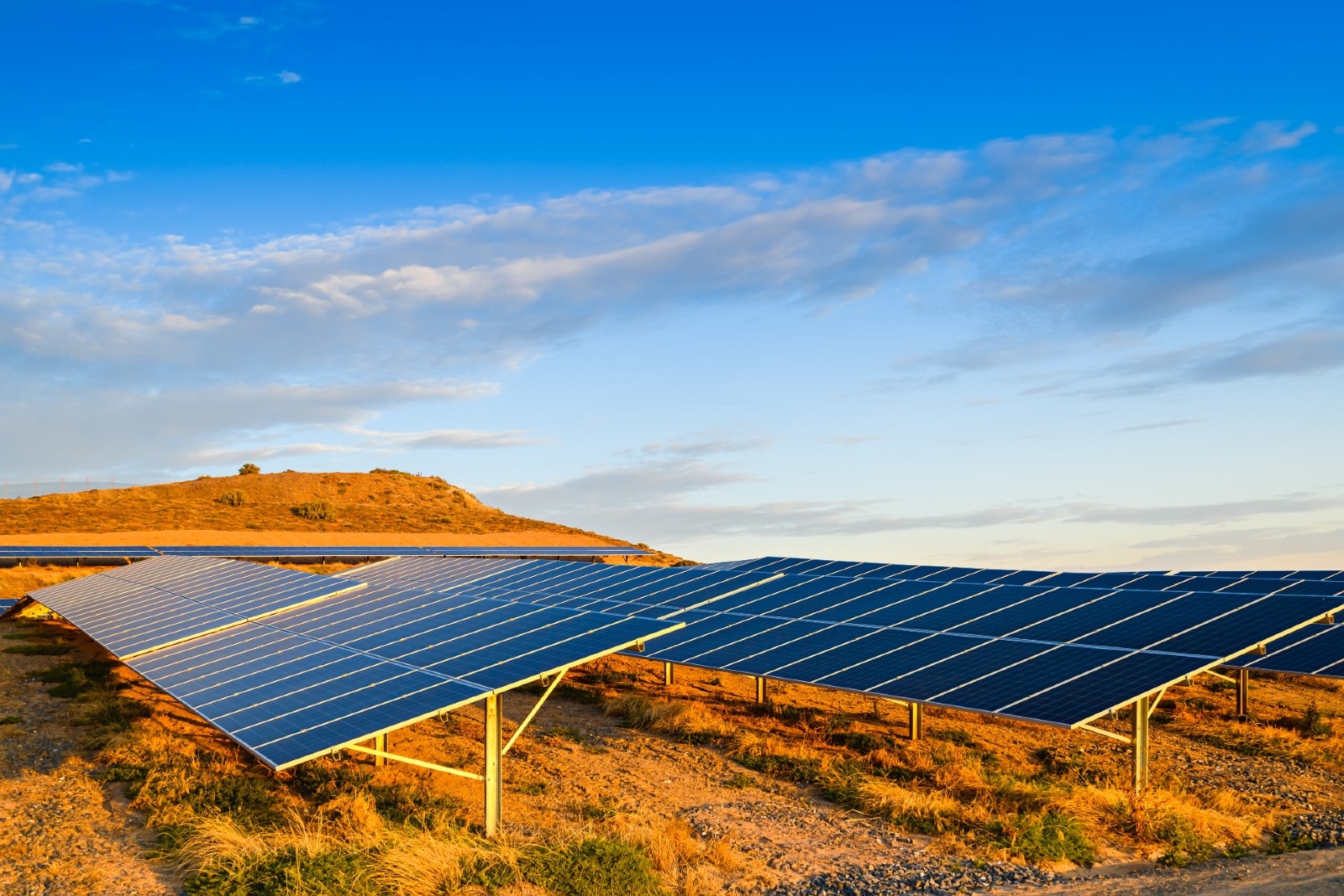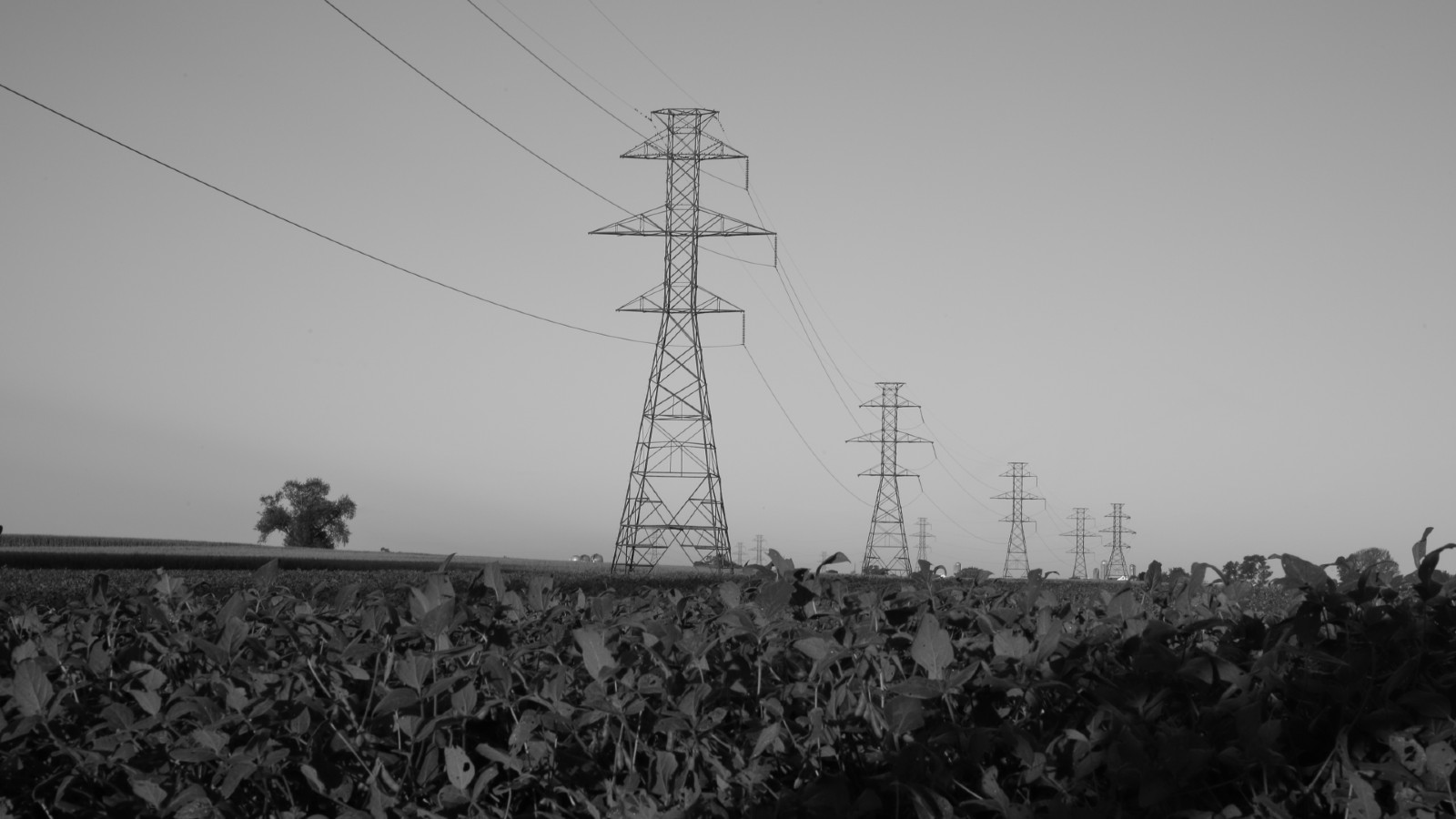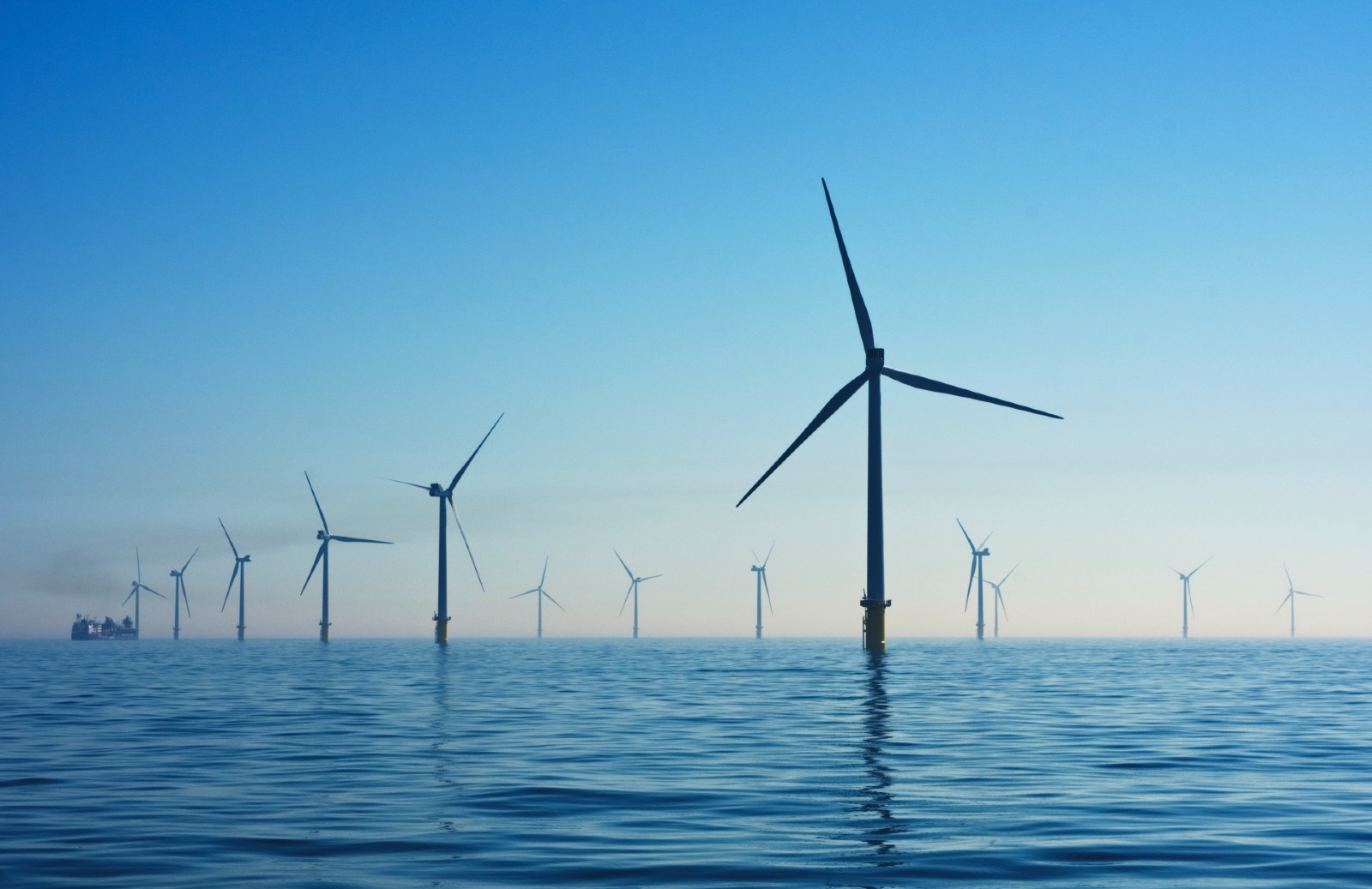- Abdul Latif Jameel Energy’s FRV reaches financial close on 10th Australian renewables project. (Solar Energy)
- Morocco passes law supporting electricity decentralization. (Legislation Watch)
- 2022 saw the GCC expansion into US, European renewable energy companies. (M&A)
- Jordan lands EUR 115 mn loan from Germany to boost water efficiency. (On Our Radar)
- KSA’s Public Investment Fund is eyeing a USD 250 mn stake in Saudi Tabreed. (What We’re Tracking Today)
- Saudi Arabia is running two pilot programs to store carbon in rocks. (What We’re Tracking Today)
- Here’s what to expect when Volvo’s electric SUV makes its UAE debut in 2024. (Climate Store)
- Dubai students tackle UAE’s USD 6 bn food waste losses with Digi Bin. (On Your Way Out)

Wednesday, 21 December 2022
Another Australian solar farm for Abdul Latif Jameel Energy’s FRV
TL;DR
WHAT WE’RE TRACKING TODAY

Good morning, friends. If the dearth of big climate news in our neighborhood and the rest of the world is any indication, we’re well on our way to the typical end-of-year holiday news slowdown.
THE BIG CLIMATE STORY- We have a couple of stories getting ink as we slide into 2023. Morocco’s House of Representatives unanimously approved a bill allowing citizens to generate, store, and sell their own electricity from renewables and Fotowatio Renewable Ventures Australia — a subsidiary of KSA’s Abdul Latif Jameel Energy and Environmental Services — reached financial close on its 10th Australian renewables project, a 300 MWac solar farm in New South Wales after securing a green loan.
ALSO- Saudi Arabia’s Public Investment Fund is eyeing a USD 250 mn stake in Saudi Tabreed.
^^ We have chapter and verse on these stories and more in the news well, below.
THE BIG CLIMATE STORY OUTSIDE THE REGION- We’re experiencing the end of year news slowdown today, with no big climate story dominating international press coverage. Instead, some outlets are doing a general climate news round-up. Climate and sustainability regulation saw its biggest ever push in 2022, with policymakers determined to clamp down on corporate greenwashing, Reuters notes. 2022 also saw links strengthen between climate policy, trade, and geopolitics as soaring energy prices heightened the urgency of the renewables shift and trade tensions mounted in the wake of the US Inflation Reduction Act — which will heavily subsidize US-made products to boost climate action — Bloomberg notes.
Outlets are also looking at key environmental concerns that will continue to drive the green conversation in 2023. The Alliance to End Plastic Waste — whose core funding sources include petrochemical giants like ExxonMobil — has “barely made a dent” in its professed goal of removing 15 mn tons of plastic from the environment over five years, an investigation by Bloomberg Green has found. And while scientists and conservationists welcomed this week’s “landmark” COP15 agreement, it’s also drawing criticism for a lack of concrete language around some targets and for not addressing many of the underlying drivers of biodiversity loss, according to the Financial Times.
WATCH THIS SPACE #1- Asset managers will have to disclose their environmental footprint post-COP15, Bloomberg reports.The penning of the Kunming-Montreal Global Biodiversity Framework agreement — signed by some 196 countries on Monday — will see nations committing to the protection of 30% of the planet’s oceans and lands by 2030. The agreement “is a signal the financial community cannot ignore,” global head of sustainable investment at Schroders Plc. Andy Howard told the newswire.
REFRESHER- The Montreal-Kunming pact includes 23 targets aimed at the elimination, phasing out, or reform of environmentally harmful subsidies by a minimum of USD 500 bn each year by 2030. We have the full rundown of the agreement here.
WATCH THIS SPACE #2- KSA’s Public Investment Fund is eyeing a USD 250 mn stake in Saudi Tabreed, Bloomberg reports, citing sources close to the matter. The acquisition would give Saudi Arabia’s wealth fund a stake in the local arm of UAE-listed National Central Cooling Company ahead of an anticipated IPO in the next 2-3 years. Saudi Tabreed is co-owned by Saudi Arabia’s Vision Invest, UAE public joint stock company Tabreed, IDB Infrastructure Fund II, and Riyadh-based Almutlaq Group. The size of the stake remains undisclosed.
WATCH THIS SPACE #3- Saudi Arabia is running two pilot programs to store carbon in rocks, according to a statement. The programs use mineralization technology to capture CO2 from Jazan Economic City and combine it with water from the Red Sea to mineralize it. The technology will enable the Kingdom to potentially store more than 1k years worth of carbon emissions underground, according to an associate professor at King Abdullah University of Science and Technology (KAUST). KSA is also exploring geothermal energy — a renewable source of energy that generates heat within the earth — with a series of experimental wells being dug on KAUST’s premises. Earlier this week, Saudi Arabia announced that it is designing its first direct capture plant. Saudi Arabia is also exploring mining to leverage on energy-transition minerals and metals.
PSA- The UAE’s First Abu Dhabi Bank (FAB) has launched a new sustainability-focused current account for its corporate clients, according to a WAM statement. The funds held in these accounts will be used to invest in projects that meet the sustainability criteria of FAB’s Sustainable Finance Framework, the statement notes.
|
***
YOU’RE READING ENTERPRISE CLIMATE, the essential MENA publication for senior execs who care about the world’s most important industry. We’re out Monday through Thursday at 4am Cairo / 5am Riyadh / 6am UAE.
Were you forwarded this email? Get your own subscription without charge here or reach out to us on climate@enterprisemea.com with comments, suggestions and story tips.
***
CIRCLE YOUR CALENDAR- Saudi Arabia will host the International Conference on Water Resources and Arid Environments next Monday, 26 December and Tuesday, 27 December in Riyadh. The conference will include panels on enhancing water conservation efforts, utilizing tech to maximize management of water resources, combating desertification and upscaling biodiversity efforts. You can register for the event here.
UAE renewable energy firm Masdar will host Abu Dhabi Sustainability Week from Saturday, 14 January to Saturday, 21 January. The event will gather eight presidents and prime ministers and 30k participants in a series of conferences and summits including the Atlantic Council’s Global Energy Forum, the World Future Energy Summit, Masdar’s Green Hydrogen Summit, The International Renewable Energy Agency’s Youth Forum, and the Abu Dhabi Sustainable Finance Forum.
The UAE is hosting the Atlantic Council’s Global Energy Forum on Saturday, 14 January and Sunday, 15 January in Abu Dhabi. The forum will discuss the ongoing global energy crisis and its impact on the green transition, energy security, and decarbonization.
Check out our full calendar on the web for a comprehensive listing of upcoming news events, national holidays and news triggers.
SOLAR ENERGY
Abdul Latif Jameel Energy’s FRV reaches financial close on 10th Australian renewables project

FRV reaches financial close on Australian solar farm: Fotowatio Renewable Ventures Australia (FRV) — a subsidiary of KSA’s Abdul Latif Jameel Energy and Environmental Services — reached financial close on its 300 MWac Walla Walla solar farm in New South Wales after securing a green loan, according to a press release. The unspecified amount was secured from ING Group, the Clean Energy Finance Corporation and Export Development Canada.
And some of that energy is going to Microsoft: FRV signed a 15-year power purchase agreement (PPA) to provide energy from the farm to Microsoft last year to fully power its Australian data centers with renewable energy by 2025, the statement notes. The agreement was “instrumental” in helping FRV secure funding for the project.
What do we know about the solar farm? FRV has tapped Spanish solar energy company Gransolar and Chinese smart energy solutions provider Chint Solar to construct the project in a joint venture, which will later be connected to the grid. Walla Walla is FRV’s fifth project in New South Wales and its 10th project in Australia, bringing the total capacity of the 10 projects to over 1 GW.
FRV has been very active this quarter: FRV announced that its Metz Solar Farm — also in Australia’s New South Wales — was running at full capacity with an output of 115 MW in September. Later that month, it announced financial close on a EUR 81 mn (USD 86.2 mn), 123 MWp PV plant in Spain. In October, FRV invested USD 10 mn in German solar-as-a-service provider Ecoligo to expand the company’s portfolio of commercial and industrial customers. It also acquired two battery storage projects in the UK with a combined capacity of up to 100 MW for an undisclosed sum. FRV also acquired a majority stake in Greek battery energy storage company Wootis SA’s 600 MW battery energy storage system (BESS) project last month.
LEGISLATION WATCH
Morocco passes law supporting electricity decentralization

Morocco makes decentralized electricity production law official: Individuals and businesses in Morocco will be allowed to generate, store, and sell their own electricity from renewables after Morocco’s House of Representatives unanimously approved a new bill on electricity self-production, according to a statement. While the bill aims to regulate electricity production for self-consumption, it also touches upon the possibility of selling excess electricity to the grid. The legislation — which was approved by the Moroccan Senate in November 2021 — became law yesterday.
What does the law entail? The bill will help regulate decentralized electricity generation, creating a framework that would facilitate the storage, purchase, and sale of energy produced by independent power producers to distribution network operators, the statement notes. The bill also includes a provision on upgrading the country’s electricity grid to enable the transfer of electricity between generators and operators.
What the law is targeting: The bill aims to resolve the legal vacuum on unregulated self-production plants, the House said. The country also wants to shore up its energy needs in anticipation of increased demand, while also ensuring that it meets climate targets. While Morocco has not set a carbon neutrality target, it has committed to an unconditional emissions reduction of 18.3% below business as usual (BAU) scenarios by 2030, and aims to push emissions 45% below BAU by 2030 if it gains international support for decarbonization, the climate action tracker notes citing the country’s latest nationally determined contribution.
Reducing energy consumption: The kingdom also wants to reduce energy consumption by 20% compared to a BAU scenario in 2030 and have renewable energy account for 52% of its installed electric capacity by 2030.
YEAR IN REVIEW: M&A
2022 saw the GCC expansion into US, European renewable energy companies

The GCC’s appetite for Western renewables firms just kept growing: GCC sovereign wealth funds and private sector firms have embarked in 2022 on a “shopping spree” of acquisition and investment in renewables firms outside the MENA region — notably in Europe and the US — especially in the last quarter of the year.
The UAE’s Mubadala has been particularly active: Abu Dhabi-based sovereign wealth fund Mubadala Investment Company acquired stakes in German offshore wind developer Skyborn Renewables and US offshore project Bluepoint Wind in October. No information was provided on the size of the investments or Mubadala’s stake in each company. KSA’s PIF also came in on the Skyborn investment: In Saudi Arabia, the Public Investment Fund (PIF) recently announced its plans to acquire up to 9.5% in Skyborn, for an undisclosed figure. The sovereign wealth fund also secured an undisclosed stake — which Bloomberg estimated to be at least 20% — in Singapore-based carbon trading exchange AirCarbon Exchange in November. Mubadala was part of a BlackRock-led consortium that announced its investment of USD 525 mn in Indian renewable energy firm Tata Power Renewables in April.
And Mubadala is eyeing more: The wealth fund recently sold its majority stake in Masdar to Adnoc and Taqa — though it retains a 33% stake in Masdar’s renewables business and will hold a 33% stake in the company’s nascent green hydrogen business. This is all part of a plan to grow Masdar’s footprint within and beyond MENA, targeting renewable energy capacity of at least 100 GW by 2030. Expansion plans include entry into Turkmenistan with a 100 MW solar plant and the building of a USD 600 mn, 500 MW wind farm in Uzbekistan.
Battery storage was also the name of the game for the UAE’s Masdar: Masdar acquired UK-based BESS outfit Arlington Energy in October, with no information given about the size of the investment. The companies will develop, construct, manage, and finance BESS projects under one Masdar-Arlington platform, and enable Masdar to increase its renewables investments and energy storage operations in Europe.
Saudi Arabia’s Abdul Latif Jameel — through its subsidiary Fotowatio Renewable Ventures (FRV) made a flurry of investments: FRV — acquired by Abdul Latif Jameel in 2015 — reached financial close on a EUR 81 mn, 123 MWp PV plant in Spain in September. FRV invested EUR 10 mn German solar-as-a-service provider Ecoligo in a Series A round in October, fueling Ecoligo’s expansion of its operations — including financing, planning, construction and maintenance of solar projects. Later that month, FRV acquired two battery energy storage (BESS) projects in the UK with a combined capacity of up to 100 MW for an undisclosed figure from the UK’s RE Projects Development. And in November, FRV acquired a majority stake in Greek renewables company Wootis SA’s 600 MW BESS project — also for an undisclosed sum. FRV has just reached financial close on its 300 MWac Walla Walla solar farm in New South Wales (as we mention in Solar Energy above). This brings FRV’s total capacity of its 10 projects in Australia to over 1 GW.
Qatar made a splash with a hefty equity investment in Germany: The Qatar Investment Authority (QIA) is investing some EUR 2.4 bn in German utilities provider RWE in a debt-to-equity swap that will eventually see QIA own 9.09% of RWE. The transaction — which is expected to be completed in 1H 2023 — could enable RWE to acquire 100% of US renewable energy developer Con Edison Clean Energy Businesses, making RWE the second-largest solar operator in the US. QIA also led a EUR 250 mn series D investment round for Paris-based biotech company Innovafeed — which produces insect protein used to feed plants and animals, to reduce the environmental impact of industrial agriculture — in September.
And Qatar’s Nebras Power built on its existing stake in Australian wind power: Doha-based energy and investment firm Nebras Power recently acquired a 49% stake in Gold Wind Australia’s USD 750 mn 312 MW Moorabool Wind Farm in Victoria. The Qatari company had previously purchased a stake in Gold Wind Australia’s USD 506 mn Stockyard Hill Wind Farm, also in Victoria.
Oman’s OIA is supporting US lithium-ion battery recycling: The Oman Investment Authority (OIA) is contributing to a USD 300 mn equity and debt investment in US lithium-ion battery recycling company Ascend Elements. No information was provided on the investment size of OIA or other investors, or their equity stakes in Ascend.
Kuwait snapped up a stake in a US-based charging station firm: Kuwait’s Agility Ventures — the corporate venture arm of supply chain services and infrastructure firm Agility — co-led a USD 40 mn series A investment round in US-based EV charging station company Loop Global.
And Wafra snapped up a majority stake in a US utility-scale renewables developer: GCC-focused alternative asset manager Wafra acquired a majority stake in US utility-scale renewable asset developer Mission Clean Energy in October. No details were provided on the size of the investment or Wafra’s stake. Mission will use the investment to expand its project pipeline, with a focus on solar and storage in the US, we noted.
FROM THE CLIMATE STORE

Volvo EVs coming to the UAE in 2024: Swedish car manufacturer Volvo says it will be introducing the Volvo EX90 — a 7-seater EV SUV — in the Emirates through its UAE representative Al-Futtaim Automotive Group’s arm Trading Enterprises, Trade Arabia reports. Volvo is branding the EX90 as its safest car to date, the automaker said at its launch event for the car (watch, runtime: 4:52).
The specs: The EX90 will cover over 480 km on a full charge with some 500 horsepower. 250kW DC fast-chargers will recharge its battery from 10 to 80% in under 30 minutes, according to Volvo.
Sustainable inside and out: The fully electric SUV will be partially made from recycled aluminum, recycled steel, and repurposed plastics. (watch, runtime: 00:07:05).
Zero collision vision: The SUV will come equipped with a whopping 16 ultrasonic sensors, five radar systems, and eight cameras to detect the distance, makeup, and proximity of objects near the car. The EV also packs luminar sensors — laser tech — to estimate objects size, shape, and geometry to 250 meters in complete darkness and to minimize accidents as part of Volvo’s Zero Collision Vision.
They have driver safety (and kids + pets) covered: The EX90 will have two cameras inside of the car to sound alarms when drivers are showing signs of drowsiness, illness, and intoxication. It will also pack a detection system to remind and warn drivers when they forget their young ones or pets in the vehicle — especially during summer.
The company has yet to disclose definite price tags, but estimates tell us the model will be “well equipped” under USD 80k.
ALSO ON OUR RADAR
Jordan receives loan to reduce water loss: Jordan signed a EUR 115 mn loan agreement with the German Development Bank on Monday to increase water efficiency in the King Abdullah Canal, according to a statement. The climate protection project will be implemented over three phases. USAID granted the Hashemite Kingdom USD 10.45 mn to improve the canal’s infrastructure earlier this month.
ON YOUR WAY OUT

UAE students tackle waste to make biogas: Three computer science undergrads at the Canadian University in Dubai created a smart bin and waste management platform they call Digi Bin in an effort to turn Emirati waste into biogas, The National reports. The platform aims to bring down the UAE’s whopping USD 6 bn bill of food waste losses.
How will the platform work: The Digi Bin platform will allow users to scan a code on their smartphones upon discarding their waste to store their tally of disposal amounts via a mobile app. After several disposals, the app users may then be rewarded with carbon credits in recognition of their efficient waste management efforts, the news outlet says.
From waste to renewable energy: The students’ bins would come equipped with sensors to weigh the amount of food discarded, and then the bio trash would be sent to waste-to-energy plants to enable renewables production in the form of biogas. The trash that cannot be produced for energy generation will be used for fertilizer production.
CALENDAR
DECEMBER
26-28 December (Monday-Wednesday): KSA’s International Conference on Water Resources and Arid Environments, Riyadh, Saudi Arabia.
JANUARY 2023
10-12 January (Tuesday-Thursday): The Future Minerals Forum, Riyadh, Saudi Arabia.
12 January (Thursday): Business Transition to Net-Zero – the Path Towards a Successful Low-Carbon Future Forum, Bahrain.
13 January (Friday): The International Renewable Energy Agency’s Youth Forum, Abu Dhabi, UAE.
14-21 January (Saturday-Saturday): Abu Dhabi Sustainability Week, Abu Dhabi, UAE.
14-15 (Saturday-Sunday): Global Energy Forum, Abu Dhabi, UAE.
16-18 January (Monday-Wednesday): EcoWASTE, Abu Dhabi National Exhibition Center (ADNEC), UAE.
16-18 January (Monday-Wednesday): World Future Energy Summit, Abu Dhabi National Exhibition Center (ADNEC), UAE.
22-24 January (Sunday-Tuesday): ESF MENA 2023 – Energy and Sustainability Forum, Manama, Bahrain.
January 2023: Bid submission deadline for green hydrogen projects to Hydrogen Oman (Hydrom).
FEBRUARY 2023
6-8 February (Monday-Wednesday): Saudi International Marine Exhibition and Conference, Hilton Riyadh, Saudi Arabia.
13-15 February (Monday-Wednesday): The Egypt Petroleum Show (EGYPS) 2023, Cairo, Egypt.
21-22 February (Tuesday-Wednesday): The Arab Green Summit, Dubai, UAE.
21-23 February (Tuesday-Thursday): World Environment, Social and Governance (ESG) Summit, Dubai, UAE.
MARCH 2023
15-19 March (Wednesday-Sunday): Qatar International Agricultural and Environmental Exhibition, Doha, Qatar.
MAY 2023
1-4 May (Monday-Thursday): Arabian Travel Market, Dubai World Trade Centre, Dubai, UAE. Register here.
29-31 May (Monday-Wednesday): Electric Vehicle Innovation Summit, Abu Dhabi National Exhibition Centre, Abu Dhabi, UAE.
JUNE 2023
Bloomberg New Economy Gateway Africa Conference, Marrakesh, Morocco.
1-3 June (Thursday-Saturday): Envirotec and Energie Expo, UTICA, Tunis, Tunisia.
SEPTEMBER 2023
Chariot Limited and Total Eren’s feasibility study on a 10 GW green hydrogen plant in Mauritania to be completed.
OCTOBER 2023
2-4 October (Monday-Wednesday): WETEX and Dubai Solar Show, Dubai World Trade Centre, Dubai, United Arab Emirates.
NOVEMBER 2023
6-17 November (Monday-Friday): The UAE will host COP28.
EVENTS WITH NO SET DATE
End-2022
KSA’s Neom wants to tender three concrete water reservoir projects to up its water storage capacity by 6 mn liters.
2023
Early 2023: Egypt’s KarmSolar to launch KarmCharge, the company’s EV charging venture.
1Q2023: Oman will award two blocks of land for green hydrogen projects in Duqm, Oman.
Mid-2023: Sale of Sembcorp Energy India Limited to consortium of Omani investors to close.
Phase C of the 900-MW of the Mohammed bin Rashid Al Maktoum Solar Park in Dubai to be completed.
Saudi Basic Industries Corporation (Sabic) steam cracker furnace powered by renewable energy to come online.
4Q2023: Oman to award four blocks of land for green hydrogen projects in Thumrait, Oman.
2024
End-2024: Emirati Masdar’s 500 MW wind farm in Uzbekistan to begin commercial operations.
QatarEnergy’s industrial cities solar power project will start electricity production.
First 1.5 GW phase of Morocco’s Xlinks solar and wind energy project to be operational.
2025
Second 1.5 GW phase of Morocco’s Xlinks solar and wind energy project to be operational.
UAE to have over 1k EV charging stations installed.
2026
1Q 2026: QatarEnergy’s USD 1 bn blue ammonia plant to be completed.
End-2026: HSBC Bahrain to eliminate single-use PVC plastic cards.
Iraq’s Mass Group Holding wants to invest EUR 1 bn on its thermal plant Mintia in Romania to have 62% of run on renewable energy, while expanding its energy capacity to at least 1.29k MWh.
2027
MENA’s district cooling market is expected to reach USD 15 bn.
2030
UAE’s Abu Dhabi Commercial Bank (ADCB) wants to provide AED 35 bn in green financing.
UAE targets 14 GW in clean energy capacity.
Tunisia targets 30% of renewables in its energy mix.
Qatar wants to generate USD 17 bn from its circular economy, creating 9k-19k jobs.
Morocco’s Xlinks solar and wind energy project to generate 10.5 GW of energy.
2035
Qatar to capture up to 11 mn tons of CO2 annually.
2045
Qatar’s Public Works Authority’s (Ashghal) USD 1.5 bn sewage treatment facility to reach 600k cm/d capacity.
2060
Nigeria aims to achieve its net-zero emissions target.
Enterprise Climate is available without charge thanks to the generous support of HSBC (tax ID: 204-901-715), the leading corporate and retail lender in Egypt; and Infinity Power (tax ID: 305-170-682), the leading generator and distributor of renewable energy in Africa and the Middle East. Enterprise Climate is delivered Mon-Thurs before 4 am UAE time. Were you forwarded this copy? Sign up for your own delivery at climate.enterprise.press. Contact us on climate@enterprisemea.com.

